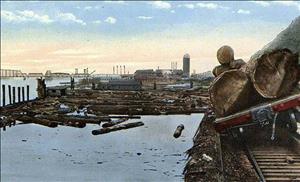On December 22, 2005, Weyerhaeuser Company’s large-log sawmill in Aberdeen closes after 81 years of operation. Eighty-three employees, some of them third-generation sawmill workers, lose their jobs. Aging machinery, overcapacity, high fuel prices, and greater global competition all combine to make the mill unprofitable. The closure is another blow to the already-stumbling Aberdeen economy, which has endured the effects of a declining timber industry since the early 1980s. In 2009, Weyerhaeuser’s two remaining mills and a log export yard in nearby Bay City will close, bringing an end to the company’s presence in the town.
Weyerhaeuser Timber Company opened its first mill in Aberdeen in 1924. The company had owned timberland in Grays Harbor County since the early 1900s, but at first it sold the timber cut from those lands to local mills. Beginning in the 1910s, the company responded to increased demand in the Midwest and on the East Coast (and to reduced transportation costs due to the newly completed Panama Canal) by opening their own mills. The large-log mill in Aberdeen processed enormous logs from old-growth forests in Grays Harbor County.
The mill opened during a year that would prove to be one for the record books. In December 1924 Grays Harbor residents celebrated the first time the county’s mills had exported a billion board feet of lumber. That is roughly the equivalent of the lumber needed to build 100,000 wood-frame houses. A decade earlier most of the lumber produced in the Northwest was used in the region. In the 1920s, 80 percent left the region by rail and sea for the rest of the country and around the world. Several more years in the 1920s would see the export of more than a billion board feet.
The Great Depression of the 1930s brought the boom to an abrupt halt. Mills produced between 200 million and 500 million board feet per year between 1930 and 1937. Employment in the mills dropped by 50 percent by 1931. Those who had jobs struggled by with fewer hours and less pay.
With the advent of World War II, demand for lumber increased again and Aberdeen’s mills picked up production again. New mills opened that processed pulp, veneer, and other wood products, but Grays Harbor would never again export a billion board feet in a year, and some lumber companies would never fully recover. Schafer Brothers Logging Company closed four mills on the harbor during the 1930s because of what a company history called a “realistic view of the future log supply on Grays Harbor” (Holbrook, 95). After the culling of many businesses and mills during the 1930s, there were no large closures in Aberdeen in the next several decades.
The 1980s saw an end to the conditions that supported Aberdeen’s lumber-based economy. A national recession brought demand for lumber down. Declining log supplies after decades of clearcutting and little reseeding made logs more expensive and harder to get. At the same time, the public lands many mills had come to rely on became the focal point of a dispute over land-use policy. In 1990 the Northern Spotted Owl was listed as “endangered” and logging was restricted on much of the remaining publicly owned old-growth forest.
Concurrently, many of the lumber companies that survived the era’s difficulties saw the growing competition brought by globalization and began restructuring their operations. While the number of sawmills in the state declined by 60 percent between 1992 and 2004, lumber production increased by 73 percent. Mill companies consolidated their operations and made them more efficient, requiring fewer workers.
Weyerhaeuser benefitted from owning its own timberland, but by 2005 the age of the large-log mill, the costs involved in running it, and global competition in the lumber industry led the company to close the mill. Eighty-three employees lost their jobs. Calvin O’Brien, a third-generation sawmill employee was quoted in
The Seattle Times
, saying, “I’m going to take this as a wake-up call that I need to get out of this volatile industry (“83 Lose Jobs as Aberdeen Sawmill Closes”). In 2009 Weyerhaeuser closed its two remaining operations in Aberdeen. Lumber jobs had already been reduced to a relatively small percentage of the town’s total employment, limiting the job-loss impact on the economy, but the closings still represented a loss of hard-to-find well-paying jobs.

